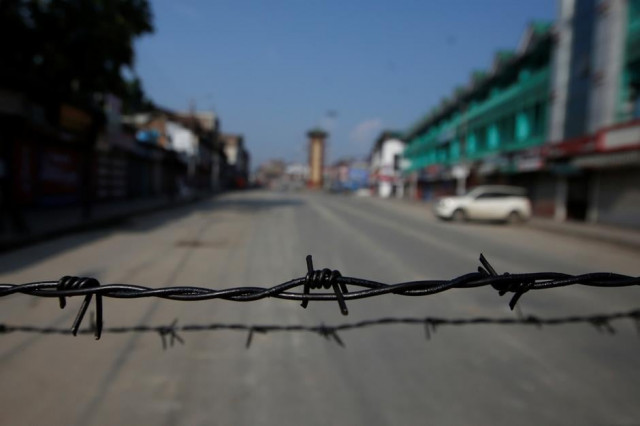Indian judiciary’s real test
It is reported that Modi’s move will be challenged in the superior courts by different segments of the Indian society

PHOTO: REUTERS
“It is time to put to test the Indian judiciary, which claims to be independent and takes pride in protecting civil liberties, rule of law and human rights. I still believe that it shall rise to the occasion and protect innocent and unarmed Kashmiris from the state and Hindu terrorism which are two sides of the same coin,” said former additional attorney general Waqar Rana while talking to The Express Tribune.
Rana is known among a few Pakistani lawyers who have a firm grip on Indian Constitution and the role of its judiciary.
India abolishes occupied Kashmir special status with rushed decree
It has been reported that Modi’s move will be challenged in the superior courts by different segments of the Indian society.
Former law officer Waqar Rana, however, believed that Indian judiciary had failed to protect its minorities – Muslims, Sikhs and Christians, adding that if secularism was the basic feature of the Indian constitution then it should be used to protect minorities.
Rana said Indian commitment to the world that it would honour the right to self-determination stood translated in Articles 35-A and 370.
“It is more than human rights. It is a sovereign assurance. Human rights can be suspended or amended but a sovereign commitment made to the world is to be honoured,” he added.
Rana believed that it was a challenge to the conscience of a civilised world by the Indian government.
He, however, lamented that Indian superior judiciary was pro-executive and it had failed to protect the rights of minorities in several cases, including Babri mosque, Gujrat riots, Golden temple, Goan Christians and, most recently, lynching over cow slaughter.
Another senior lawyer said though the Indian judiciary protected the rights of minorities, it did not interfere in the matters which had a foreign policy angle and were going to be popular with the majority. “It is unlikely that the Indian SC will interfere in this matter.”
Meanwhile, Pakistan Bar Council Executive Member Raheel Kamran Sheikh has written a letter to all bar council members to “hold an urgent meeting to pass a resolution that the legal community must use its resources in terms of friendly relations within the legal fraternity in India to request any senior advocates practicing there in constitutional law to advise and consider challenging the executive acts before the Supreme Court of India”.
Pakistan is united over Kashmir issue: AJK PM
He also urged the state of Pakistan to make every effort on all diplomatic fronts to voice against such state terrorism and anarchical move of India granting her the licence of genocide against vulnerable Kashmiris and posing imminent threat to the regional peace and security.
He said, “Pakistan must also seek the opinions of internationally renowned jurists in the Public International Law and explore the options and remedies, if any, available to her as well as Kashmiris against the unwarranted acts of India.”
In his letter, Raheel said like millions of Pakistanis and Kashmiris, he was at a complete loss to make sense of the unprecedented constitutional travesty regarding Articles 35-A and 370 of the Constitution of India that had been exhibited by PM Modi and his allies’ fascist majority government.
“This is a blatant attempt on part of the Modi regime to crush the movement for self-determination for which Kashmiris have sacrificed many lives since 1947, destroy their fundamental rights and provide a licence to the state of India to indulge in genocide, state terrorism, war crimes and crimes against humanity. Article 35-A gives Jammu and Kashmir the right to decide who qualifies as permanent residents and gives the category special rights in government jobs, buying property in the state, scholarships and other schemes.”
Article 370 guarantees significant autonomy for the Muslim-majority state. It gives Jammu and Kashmir special status in terms of limited applicability of the Union's constitution to it.
Six salient features of Article 370:
(1) It exempted the state from the complete applicability of the Constitution of India. The state was allowed to have its own Constitution.
(2) Central legislative powers over the state were limited, at the time of framing, to the three subjects of defence, foreign affairs and communications.
(3) Other constitutional powers of the central government could be extended to the state only with the concurrence of the state government.
(4) The 'concurrence' was only provisional. It had to be ratified by the State Constituent Assembly.
(5) The state government's authority to give 'concurrence' lasted only until the State Constituent Assembly was convened. Once the State Constituent Assembly finalised the scheme of powers and dispersed, no further extension of powers was possible.
(6) Article 370 could be abrogated or amended only upon the recommendation of the State Constituent Assembly.
“Article 370 is indeed seen as protecting the state's distinct demographic character as the only Muslim-majority state in India. The move is designed to change the demographic make-up of Indian Occupied Kashmir by giving people from the rest of the country the right to acquire property and settle there permanently,” read the letter written by Raheel Kamran Sheikh.
It is also stated that the said articles had been removed unconstitutionally using a Presidential Order. “The BJP just made a mockery out of the Constitution.”
The letter stated the move was contrary to the basic structure and salient features of the Indian Constitution, besides being in violation of India’s international commitments and obligations under the Public International law.



















COMMENTS
Comments are moderated and generally will be posted if they are on-topic and not abusive.
For more information, please see our Comments FAQ